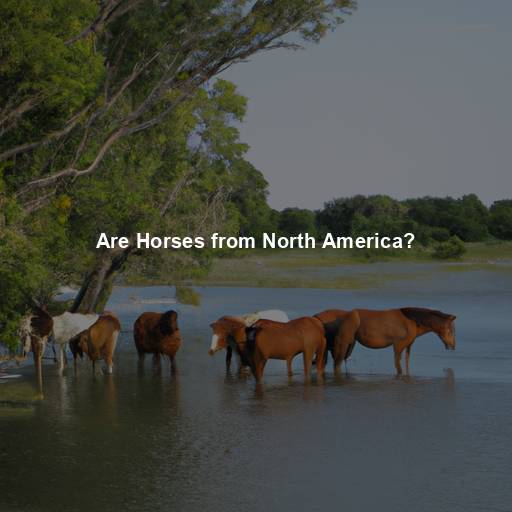Are Horses from North America?
Last Updated on October 28, 2023 by Evan
Contents [hide]
- 1 A Deep Dive into the Origins and History of Horses
- 1.1 The Evolutionary Journey of Equus
- 1.2 The North American Connection
- 1.3 The Great Migration
- 1.4 The Wild Mustangs of North America
- 1.5 The Przewalski’s Horse
- 1.6 Debunking the Myth: Horses in North America Today
- 1.7 The Impact of Horses in North America
- 1.8 The Enduring Legacy
- 1.9 Transforming Transportation
- 1.10 Shaping Hunting and Warfare
- 1.11 Cultural Significance
- 1.12 The Modern Horse Industry
- 1.13 Conservation Efforts and Preservation
- 1.14 The Beauty and Spirit of Horses
- 2 Exploring the Myths and Legends
- 3 Exploring the Human-Horse Connection
- 4 The Enduring Legacy of Horses
- 5 FAQs – Are Horses from North America?
- 5.1 Are horses native to North America?
- 5.2 How did horses come to North America?
- 5.3 Did wild horses exist in North America before the arrival of Europeans?
- 5.4 What happened to the wild horses in North America?
- 5.5 Can horses thrive in North American environments?
- 5.6 Are there different horse breeds native to North America?
- 5.7 Are there still wild horses in North America?
- 5.8 Are horses important to the culture of Native American tribes?
A Deep Dive into the Origins and History of Horses
In the vast tapestry of the animal kingdom, horses stand tall as majestic creatures, captivating our hearts and minds with their grace and beauty. But have you ever wondered where these magnificent creatures come from? Are horses native to North America? In this article, we will embark on a journey to unravel the origins and history of horses, shedding light on their connection to North America.
The Evolutionary Journey of Equus
To understand the origins of horses, we must delve into their evolutionary journey. The ancestors of modern-day horses, known as the genus Equus, first appeared around 4 to 4.5 million years ago. Fossil evidence suggests that the early ancestors of horses originated in North America.
The North American Connection
Travel back in time, dear reader, to a bygone era known as the Eocene epoch, a perplexing period spanning a whopping 56 to 34 million years ago. Can you fathom the burst of life that called the North American continent home during this enigmatic time? Picture, if you will, a bewitching array of horse-like beings, frolicking amidst the lush and captivating landscapes. Among them, the incredible Eohippus, affectionately known as the “dawn horse,” embarked on a remarkable journey of adaptations, shaping their very essence to become the breathtaking equines that we now marvel at.
The Great Migration
Picture a time, millions of years ago, when an epic shift took place, forever altering the course of life on our planet. Known as the Great American Interchange, this mesmerizing event facilitated a dynamic exchange of diverse flora and fauna, connecting the continents of North and South America like never before. As ancient land bridges formed, Mother Nature orchestrated a grand reunion, allowing majestic horses to embark on a pilgrimage back to their ancestral homeland in North America, completing a magnificent circle of life.
The Wild Mustangs of North America
Take a moment to transport yourself back in time to the 15th century when European explorers embarked on their fateful journey to North America. In a serendipitous twist of fate, these daring adventurers brought with them a gift that would forever reshape the destiny of the continent – horses. Through the hands of Spanish conquistadors and the perils of long sea voyages, these noble creatures found their way to the virgin land, taking their first breaths of freedom on this untamed soil. Unbeknownst to them, their existence would unleash a wave of perplexity and intrigue, as some of these equine pioneers slipped through the cracks, scurrying away from the clutches of captivity, to become the iconic wild mustangs that still capture our hearts today, galloping across the vast plains of North America.
The Przewalski’s Horse
While the domesticated horses we are familiar with have their roots in North America, it’s important to mention another species closely related to horses – the Przewalski’s horse. This unique and endangered species is the only true wild horse still in existence. Native to the steppes of Central Asia, the Przewalski’s horse shares a common ancestor with domesticated horses but took a separate evolutionary path.
Debunking the Myth: Horses in North America Today
Despite the rich history of horses in North America, it is essential to clarify that horses, as we know them, are not native to the continent. The modern domesticated horse, Equus ferus caballus, was reintroduced by European settlers. Nevertheless, the wild mustangs that roam parts of North America are a symbol of the intertwined history between horses and the continent.
The Impact of Horses in North America
The reintroduction of horses to North America had a profound impact on the continent’s ecosystems and the lives of indigenous peoples. Horses provided a means of transportation, transformed hunting and warfare, and revolutionized the way of life for many Native American tribes. The horse became an integral part of their culture, offering new opportunities for trade, communication, and exploration.
The Enduring Legacy
Today, horses hold a special place in the hearts of people across North America. From recreational horseback riding to competitive equestrian sports, the bond between humans and horses remains strong. Horses continue to be cherished companions, partners in work and sport, and a symbol of freedom and untamed spirit.
Transforming Transportation
The introduction of horses to North America revolutionized transportation. Prior to their arrival, indigenous peoples relied on their own physical strength and ingenuity to traverse vast distances. With the advent of horses, travel became faster, more efficient, and allowed for the exploration of new territories. The horse-drawn wagon became a common sight, facilitating trade and settlement across the continent.
Shaping Hunting and Warfare
The awe-inspiring arrival of horses on the scene brought about a dramatic shift in the world of hunting and warfare. It was as if a captivating magic had descended upon Native American tribes, unveiling a whole new realm of possibilities. The swift and nimble nature of mounted hunting took their breath away, empowering them to chase after elusive game in a thrilling dance of speed and dexterity. With the extraordinary aid of horses, these tribes extended their hunting horizons, embarking on daring quests to procure precious resources for the prosperity of their communities.
The realm of warfare underwent a radical shift with the entrance of the majestic equine companions. These noble creatures bestowed tribes with an unparalleled edge, propelling the ascendancy of warriors who mastered the art of horseback combat. Take the awe-inspiring Comanche, whose unparalleled prowess in the saddle earned them a legendary reputation, solidifying their reign over the vast expanse of the Great Plains. With horsemanship as their indomitable weapon, they harnessed an untamed power that left their adversaries spellbound.
Cultural Significance
Horses became deeply ingrained in the cultures and traditions of Native American tribes. They were revered as symbols of power, freedom, and spiritual connection. Horses played central roles in ceremonies, rituals, and storytelling, reflecting their importance in tribal life. The horse became a source of inspiration and artistic expression, with intricate horse motifs adorning pottery, textiles, and other forms of indigenous artwork.
The Modern Horse Industry
Today, the horse industry in North America is a thriving sector that encompasses various activities and professions. From horse breeding, training, and racing to recreational riding and equine therapy, horses continue to captivate and enrich our lives. Equestrian sports, such as show jumping, dressage, and rodeo, showcase the remarkable bond between humans and horses, combining athleticism, skill, and trust.
The mighty horse industry, with its indomitable economic force, weaves a complex tapestry of wealth and opportunity. Its impact is immeasurable, a swirling vortex of billions of dollars that fuels countless jobs and enterprises, breathing life into the realms of horse care, veterinary medicine, and vital infrastructure. From the grandeur of colossal racing and breeding spectacles to the humble abodes of cherished family-owned stables, this industry wields the power to shape and fortify local economies, bestowing upon them not just financial prosperity, but also a heartfelt sense of unity and belonging.
Conservation Efforts and Preservation
In a land filled with the echoes of galloping hooves and the spirit of untamed freedom, the preservation of wild horse populations has become a compelling saga. A tapestry of organizations and agencies now embarks on a noble quest to safeguard these majestic creatures, cherishing their historical and cultural value. In this intricate dance of conservation and land management, the harmony of preserving genetic diversity and protecting the ethereal qualities of wild mustang herds takes center stage, leaving us captivated by the boundless possibilities that lie ahead for these iconic beings.
The Beauty and Spirit of Horses
Beyond their historical and economic significance, horses captivate us with their sheer beauty and indomitable spirit. Whether it’s watching a horse gallop across an open field, feeling the rhythm of its movements beneath you while riding, or experiencing the bond that forms between human and horse, these magnificent creatures continue to inspire awe and wonder.
Exploring the Myths and Legends
The Horse in Native American Mythology
Horses hold a prominent place in the mythology and folklore of many Native American tribes. They are often depicted as divine beings, symbols of strength, wisdom, and transformation. Legends tell tales of horses bringing rain, guiding spirits, and aiding heroes in their quests. The horse’s role as a spiritual guide and guardian is deeply intertwined with the cultural fabric of indigenous communities.
The Wild West and Cowboy Culture
For centuries, the captivating allure of the American cowboy has captivated the collective imagination, symbolizing a mesmerizing journey into the depths of the Wild West. With steadfast determination, these rugged individuals effortlessly conquer the wild, while their trusted equine companions become the embodiment of their untamed spirit. This timeless bond between cowboy and horse transcends mere partnership, transcending into the realm of epic legend, inspiring generations through tales immortalized in literature, motion pictures, and soul-stirring melodies.
The Symbolism of the Horse
Horses have always held a special place in the tapestry of our existence, woven with threads of symbolism and mystique. They gracefully carry with them the essence of freedom and power, reminding us of the untamed spirit that dwells within each and every one of us. Strong and enduring, horses embody the embodiment of resilience, conquering obstacles with an innate sense of unwavering determination. Moreover, they serve as profound teachers, imparting invaluable lessons in trust, communication, and the profound bonds that form across species.
Grazing and Ecosystems
The majestic presence of horses, whether roaming freely or under human care, imparts a mesmerizing influence on the delicate balance of the ecosystems they embrace. Revered as herbivores, these charismatic creatures wield an undeniable prowess in shaping and defining the very fabric of plant communities through their innate grazing behavior. Journeying to the vast landscapes of North America, the untamed mustangs epitomize this harmonious dance with nature, as their discerning palates guide them to selectively partake in the verdant offerings, ensuring that no single plant species monopolizes, and thereby engendering a glorious tapestry of biodiversity.
As majestic as horses may be, their presence in an area can sometimes lead to unexpected challenges. When horse populations surpass the capacity of their surroundings, a phenomenon known as overgrazing can wreak havoc on the delicate balance of nature. This troublesome scenario causes vegetation to dwindle and soil erosion to increase, prompting scientists and conservationists to tirelessly study and manage this intricate relationship for the sake of long-term sustainability.
Habitat Modification
In the untamed realm, horses exhibit a captivating ability to reshape their surroundings. As they gracefully traverse the terrain, they leave behind a web of pathways that intricately intertwine with the environment. This enigmatic dance between horse and habitat holds the power to sway the destiny of vegetation, for better or for worse, in an ever-shifting tapestry of complex consequences.
Conservation Challenges
Protecting and managing wild horse populations is a task laden with unprecedented challenges. As these magnificent creatures roam free, clashes ensue when their existence clashes with the pursuit of other conservation goals or land utilization methods. The intricate art of striking a balance between the well-being of these herds, the environment, and the diverse range of species necessitates meticulous planning, scientific investigation, and harmonious cooperation amongst numerous stakeholders.
The Future of Horses in North America
As we gaze into the horizon of what lies ahead, it becomes intricately woven into the fabric of our collective consciousness to earnestly ponder upon the relentless conservation endeavors, the ceaseless pursuits of scientific inquiry, and the unwavering commitment to responsible custodianship that shall lay the foundation for the prosperous journey of horses in the vast expanse of North America. The harmonious dance between sustainable methodologies, wherein the delicate equilibrium between the ecological tapestry and cultural tapestry remains unmarred, coupled with astute economic acumen, shall truly serve as the compass that adroitly steers the multifaceted relationship between these majestic creatures and the enchanting continent they call home.
Additionally, continued education and awareness about the history, biology, and conservation of horses can foster a deeper appreciation and understanding of these magnificent creatures. By recognizing their ecological role and the interconnectedness of all species, we can work together to create a harmonious coexistence that benefits both horses and the natural environment.
Exploring the Human-Horse Connection
Therapeutic Benefits
Horses have transcended their traditional roles to become veritable therapists, offering solace and support to individuals grappling with physical, cognitive, and emotional obstacles. Delving beyond the realms of history, culture, and nature, equine-assisted therapy has unveiled a wondrous realm of healing and growth. Within this realm, the profound bond between humans and horses flourishes, fostering an environment free of judgment and bursting with potential for emotional well-being.
Equine-Facilitated Learning
In the realm of experiential learning, a captivating and enigmatic presence takes the stage – horses. These majestic creatures, with their innate wisdom, assume roles as both tutors and reflections of human behavior. In the realm of equine interactions, individuals embark on a transformative journey where valuable insights into their communication styles, leadership prowess, and emotional acumen shimmer like hidden treasures. This extraordinary avenue of personal growth, known as equine-facilitated learning, heralds not only self-discovery but also a potent catalyst for empowerment.
Recreational Activities
There is a certain inexplicable magic in the relationship between humans and horses that brings joy, contentment, and a sense of purpose to countless individuals. Whether they are embarking on leisurely trail rides, or pushing the limits of their abilities in competitive sports, the act of riding horses offers a truly exceptional opportunity to immerse oneself in the wonders of nature and forge a profound bond with these majestic creatures. It is an extraordinary connection built upon mutual trust, deep respect, and a wealth of unforgettable shared experiences that continues to capture hearts around the world.
Cultural Significance and Traditions
Horses have played a central role in various cultural traditions and celebrations throughout history. From rodeos and parades to ceremonial events, horses are often featured prominently, embodying strength, beauty, and tradition. These cultural practices not only celebrate the deep-rooted connection between humans and horses but also serve as a way to honor heritage and preserve cultural identity.
Riding as a Sport
Step into the exquisite world of equestrian sports, where elegance melds with power, and riders forge an unbreakable bond with their noble steeds. Heart-stopping displays of sheer athleticism, from the artistry of dressage to the adrenaline-fueled show jumping, leave spectators in awe. These awe-inspiring competitions, stretching from local arenas to global stages, captivate audiences of all walks of life, evoking a profound appreciation for the transcendent harmony between horse and rider.
The Enduring Legacy of Horses
Throughout history, horses have left an indelible mark on the landscapes, cultures, and hearts of North America. From their ancient ancestors wandering the prehistoric plains to their role in shaping the Wild West and their continued presence in recreational activities and therapy, horses embody resilience, beauty, and the enduring bond between humans and animals.
As we delve into the intricate chapters of the past, intertwined with the ever-evolving kinship between majestic horses and the vast landscapes of North America, it becomes apparent that our role as guardians necessitates mindful action and unwavering dedication to conservation. By delving into the intricate web of their ecological influence, unraveling the threads of cultural significance, and acknowledging their profound therapeutic potential, we can forge a united path towards safeguarding this extraordinary inheritance for future generations, imbued with awe and reverence.
So, the next time you encounter a horse, whether in the wild, at a stable, or in the pages of a book, take a moment to appreciate the profound connection and the remarkable journey that has brought these magnificent creatures into our lives.
FAQs – Are Horses from North America?
Are horses native to North America?
No, horses are not native to North America. The domestic horse, also known as Equus caballus, originated in Eurasia. Horses were brought to North America by European explorers and settlers during the 15th and 16th centuries. Therefore, horses are introduced species in North America.
How did horses come to North America?
Horses were brought to North America by Spanish conquistadors and European colonizers during the Age of Exploration. Christopher Columbus is credited with introducing horses to the New World during his second voyage in 1493. From there, horses spread throughout North America as European settlers established colonies and explored the continent.
Did wild horses exist in North America before the arrival of Europeans?
Yes, wild horses did exist in North America before the arrival of Europeans. These horses were known as the American wild horse or the American mustang and were descendants of domestic horses that had escaped or were released by early Spanish explorers and settlers. Over time, these wild horses adapted to the North American environment and formed herds in various regions.
What happened to the wild horses in North America?
It’s a wild world out there for North America’s free-spirited equines. Their numbers have been on a rollercoaster ride, thanks to a whirlwind of human meddling, vanishing habitats, and confusing government regulations. While these majestic creatures still roam in selected pockets, their once-thriving populations have taken a nose-dive. Thankfully, tireless efforts are now underway to safeguard and shepherd these wild horse communities towards a more hopeful future.
Can horses thrive in North American environments?
Discover the remarkable versatility of horses as they gracefully conquer the diverse landscapes of North America. Whether it be the boundless grasslands stretching as far as the eye can see or the towering mountains that challenge even the most intrepid souls, horses have proved themselves as resilient creatures with an unyielding spirit. Yet, amidst this awe-inspiring adaptability lies the need for careful considerations and tailored care to ensure their health and overall welfare in these ever-changing environments.
Are there different horse breeds native to North America?
No, there are no horse breeds native to North America. However, there are horse breeds that have originated or developed in North America over time. Examples of horse breeds that have been developed in North America include the American Quarter Horse, the American Paint Horse, and the Appaloosa. These breeds have become popular not only in North America but also worldwide.
Are there still wild horses in North America?
Yes, there are still wild horses in North America. These wild horse populations can be found in several states, such as Nevada, Wyoming, Utah, and Montana. Some of the most famous wild horse herds include those found in the Pryor Mountains of Montana and Wyoming, the Onaqui Mountains of Utah, and the Outer Banks of North Carolina.
Are horses important to the culture of Native American tribes?
Throughout the annals of history, the presence of horses has conveyed an undeniable impact on the rich cultural tapestry and way of life for numerous Native American tribes. The momentous arrival of these majestic creatures, ushered in by early European explorers, instigated a profound revolution within the very fabric of Native American societies, empowering them to hunt, traverse vast distances, and engage in intricate trade networks with unprecedented efficiency. Such was the magnitude of this transformative influence that horses swiftly evolved into revered symbols of might, prosperity, and unrestrained liberty within the collective consciousness of these tribes, effectively shaping their traditions, ceremonial rites, and strategic warfare methodologies.







